Las Posadas at Padua Theatre
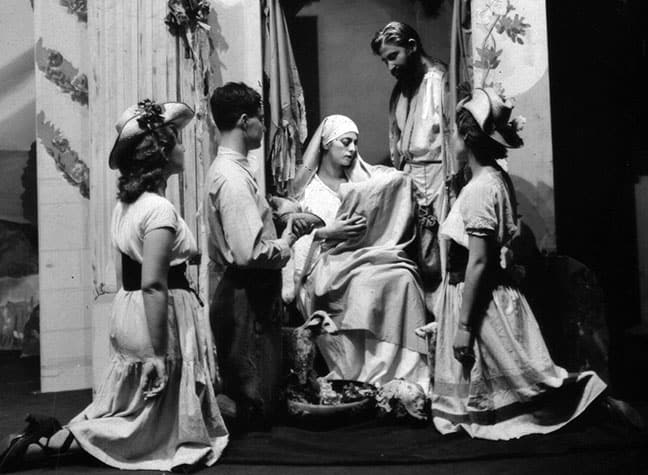
by John Neiuber
Traditions. We revere them. Sometimes we disdain them. Oftentimes we debate them. Sometimes we change them, or at least try. Some last for centuries, others a few years. They come and they go. Celebrations are planned around them. T.S. Eliot said of tradition, it is “how the vitality of the past enriches the life of the present.”
On Thursday, December 15, from 6:30 to 8:30 p.m., Claremont Heritage will again revive a longtime tradition and present “Las Posadas,” by Cielo Rojo Dance Company, at the historic Padua Theatre, where it was performed for many years by the Mexican Players. More information and tickets are at claremontheritage.org.
Between 1932 and 1974, hundreds of thousands visited Padua Hills Theatre to dine and be entertained by the Mexican Players’ productions. Built in 1930 at a cost of $75,000 — equivalent to about $1.3 million in today’s dollars — by Herman and Bess Garner, it was home to the Claremont Community Players. Padua Theatre opened to great fanfare in December 1930 with the Players’ production of “The Royal Family.” The Players would mount three full seasons of productions before the Great Depression took a toll on their ability to raise the funds needed to continue.
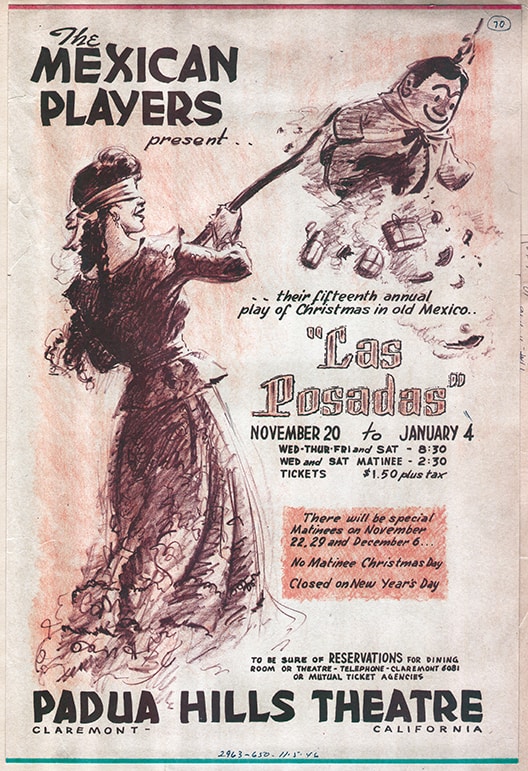
A playbill from the 1946 production of “Las Posadas” advertises admission at $1.50, the equivalent of about $23 today’s money. Photo/courtesy of Claremont Heritage
Prior to the opening of the theater, the Garners had visited Italy, where they dined on a deck overlooking the sea and were entertained by strolling musicians who played and sang. The Garners were impressed by the dinner program and decided to stage their own version of it at Padua. Pauline Deuel, in her book, “Mexican Serenade — The Story of the Mexican Players and the Padua Hills Theatre,” writes the Garners “knew many Mexican American boys and girls in the Claremont area who seemed to have a natural talent for singing and dancing and who might be persuaded to help out at Padua Hills. The Garners therefore decided to gather together such a group to serve as waiters and waitresses and to present musical numbers during the meals.”
It was so well-received that productions by the Mexican Players began with the 1932-1933 season. By October 1932, the fledgling group staged its third production, “Mi Rancho Bonito.” Again, Pauline Deuel tells us, “When two of the Players, Manual Vera, and his cousin Flavio, told Mrs. Garner about the Christmas celebrations that they remembered from their home in Guanajuato, she decided to adapt some of their reminiscences for a holiday play.”
Keeping the basic production of “Mi Rancho Bonito,” the Christmas rituals Manuel and Flavio Vera had told Bess Garner about were added to create “Christmas at Mi Rancho Bonito,” which ran from December 1933 to February 1934, and began with “Las Posadas.” Thus, a tradition of “Las Posadas” was born, which would become its own show in 1934 and ran each year until the theater closed in 1974.
“Las Posadas” traces its roots to around 1586, when it was started by Augustinian friars in the Mexico City area. They used the story to demonstrate the birth of Jesus to the Indigenous Aztec population by conducting masses for nine days. It was a meaningful time of the year for the Indigenous population in that it coincided with their solstice celebrations.
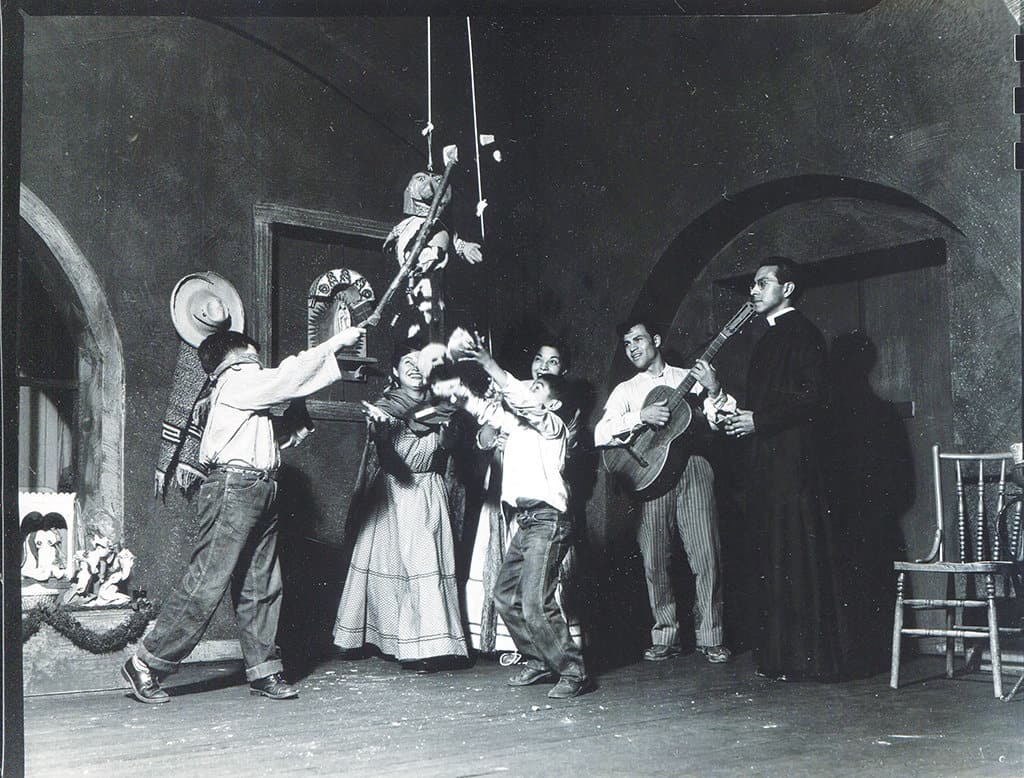
The breaking of a pinata is depicted in this scene from 1935. Photo/courtesy of Claremont Heritage
The word “posadas” is translated as “inns.” “Las Posadas” is the story of Joseph and Mary searching for a place to stay and how they are turned away until an innkeeper allows them to stay in a stable. The tradition begins on December 16 and lasts nine days until December 24. For eight days the couple is turned away and finally given refuge on the ninth day.
It was not until the 19th century that neighborhoods and other groups began to celebrate “Las Posadas” outside of the church. People would dress in costumes as shepherds, angels, wise men, and Joseph and Mary. For eight nights the couple are turned away at different houses or “posadas,” however, the procession is offered refreshments at each house where they sing Christmas songs. On the ninth night they are welcomed into the house, where the celebration continues with song, food and drink and children break open a pinata shaped like a star.
Many of today’s celebrations, like the ones staged at Padua Theatre, take place in one evening, either in an outdoor setting or in a theater, but mainly adhere to the story as it was traditionally told. “Las Posadas” was one of the most popular Padua Theatre productions. The Claremont Heritage production of “Las Posadas” is one-night only and typically sells out early.



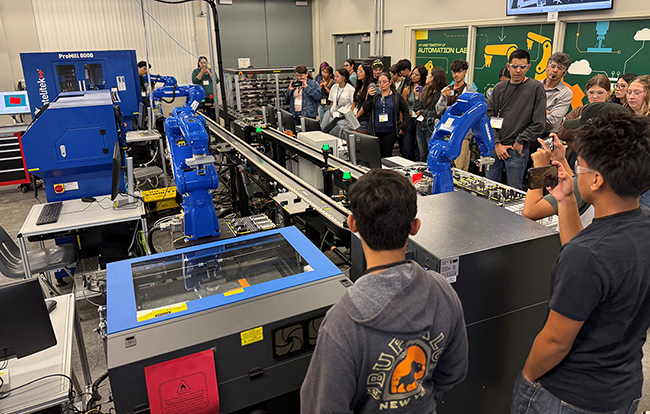



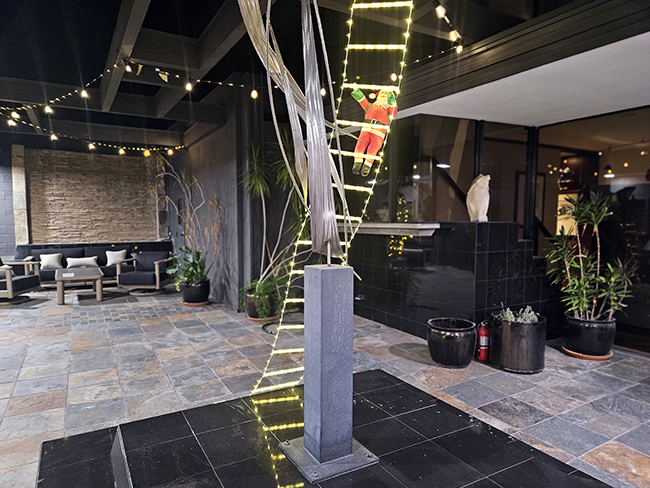
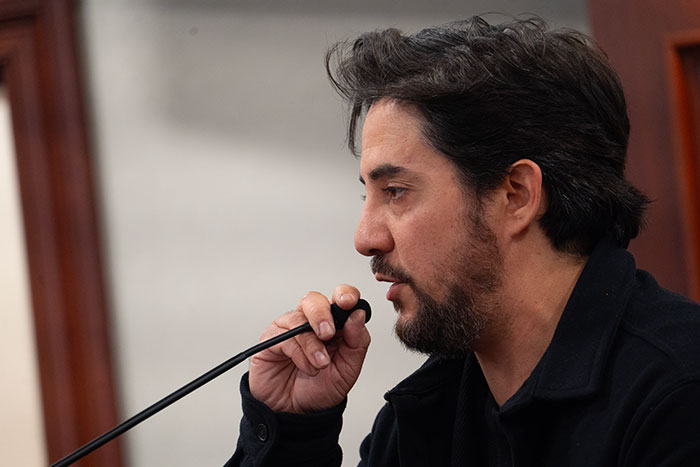

0 Comments